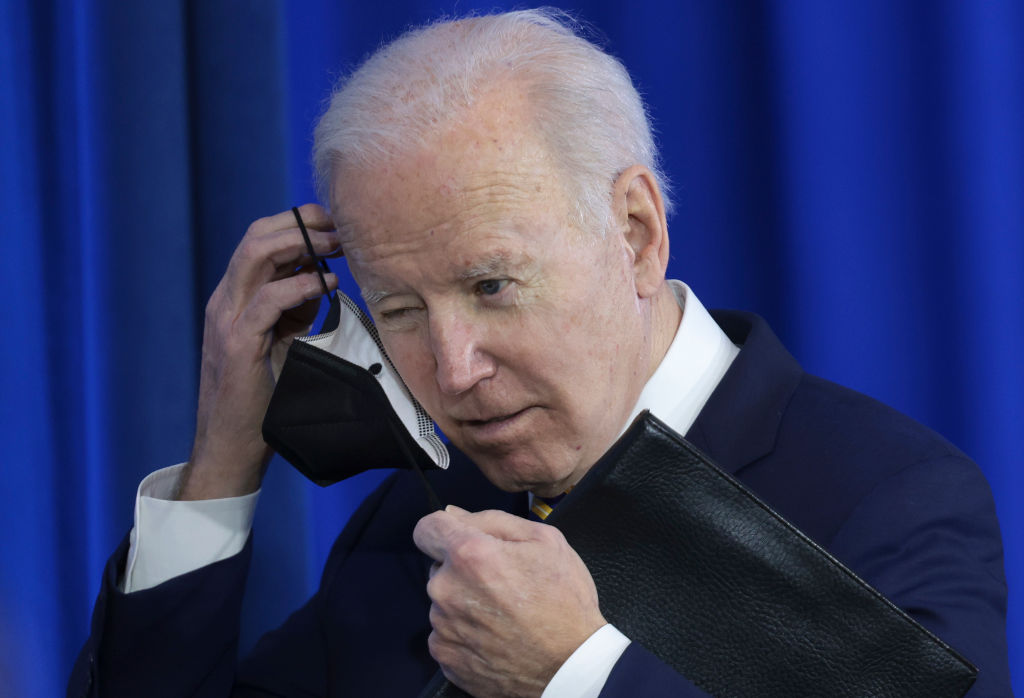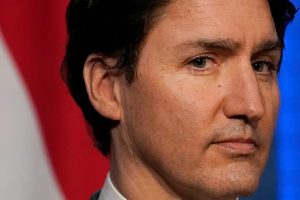The White House is in a mask muddle
What is the White House’s plan on mask mandates? At the start of the day yesterday it wasn’t clear whether the Biden administration would contest Monday’s ruling that scrapped the rules with immediate effect or, as I suggested in the Diary, whether they might see this as an opportunity to quietly drop the rule with minimal fuss. Things got no clearer as the day went on. Jen Psaki delivered stern denunciations of the ruling and reminded people of the advisability of masking up. Joe Biden, meanwhile, went for more of a you-do-you approach. It’s up to individuals whether they wear a mask, he said when asked about the ruling by a reporter.
By the evening, the administration finally appeared to have settled on a familiar tactic: punting the decision to the CDC. The Justice Department announced that it would contest the ruling if it was deemed necessary to do so by public health officials.
First, let’s consider the mandates themselves. The decision to insist on rules is not a scientific question of whether or not masks work. Rather, it requires a judgment about the advisability of a policy that forces workers to make belligerent customers wear cloth masks (except, of course, for lengthy gaps for eating and drinking) more than two years into the pandemic, when vaccines are freely available and the prevalent Covid strain is less dangerous.
An important scientific fact lost in the pandemic’s all-in-this-together messaging is that a high-quality mask will protect you, regardless of what everyone else does. That, surely, undercuts the case for too many rules telling others what to do. But for their enthusiastic supporters, rules like the federal mask mandate long ago took on symbolic significance. As Josh Barro (reporting live from the Delta Sky Club!), writes, “if you just liked seeing people forced to make sartorial expressions like your own about how much they care about Covid, then [Monday] was indeed a sad day for you.”
The mystery here is how the White House thinks this will end well for them politically. Remaining Covid rules will have to go eventually. Biden and his team claim to want to encourage Americans to learn to live with the virus. If that is the case, then whether mask mandates are scrapped this week, next week, or in two months is secondary to the fact that they will be going. And people will need to learn to deal with that. This week’s ruling was an opportunity to make that point. But the administration is oddly reluctant to do so.
Masking may seem a frivolous issue in the grand scheme of things, especially now that the pandemic is no longer front-and-center in political debates, but it adds to the Democrats’ increasingly toxic brand as scolds, fun-sponges, nags and narcs. Whether on identity politics, the pandemic or economic policy and regulation, the Democrats adopt the tone of overzealous HR manager. And enthusiasm for largely pointless rules about what to wear on your face in an airport are a small but irritating reminder of that.
The “hey, we’re just following the CDC” defense is deployed selectively and with patchy results. When the Biden administration announced that Title 42, the pandemic measure that has made it easier for agents to turn migrants away at the southern border, it insisted that this was nothing more than a dry matter of public health to be adjudicated by the CDC. Far from being a commandment handed down from on high, the rule has been debated furiously in the White House. And, with Biden feeling the heat from Democratic colleagues worried about a surge of illegal crossings when the measure is lifted next month, Axios now reports that, “President Biden’s inner circle has been discussing delaying the repeal of Title 42 border restrictions, now set to end May 23.”
Only hardline partisans can look at the last two administrations’ handling of the pandemic and insist one has “politicized” the virus while the other has followed nothing but prudential policymaking. At a certain point, deference to officials in an alphabet soup of government agencies isn’t following the science, it’s buck passing. And most Americans can see that.
*** Sign up to receive the DC Diary in your inbox on weekdays ***
Good nuclear news
On a brighter note, the administration yesterday announced that it would be allocating $6 billion to a nuclear power credit program that is designed to stop nuclear plants from shuttering in the face of rising costs.
At a state level, Democrats keen to tout their green credentials have been happy to see nuclear plants close. In New York, Andrew Cuomo oversaw the closure of Indian Point, only to see the energy gap made up by fossil fuels. California plans to close Diablo Canyon, a nuclear plant, and a statement yesterday made clear that the new Energy Department scheme has not changed that.
Even if Diablo Canyon still closes, the administration’s move is, at the very least, federal recognition of the importance of nuclear power to a greener, energy-abundant future for the United States.
The House outlook gets worse for Democrats
With the Democrats’ woes mounting, their midterm prospects get bleaker. This morning, UVA’s Center for Politics’s closely watched election ratings were updated for eleven House seats, all of them in the Republicans’ favor. Four races move from likely Republican to safe Republican, one from leans Democratic to toss-up, four from likely Democratic to leans Democratic and one from safe Democratic to likely Democratic. Ouch.
As UVA’s Kyle Klondik puts it: “Our main question about the House continues to be not whether Republicans will flip the House — although we would not completely shut the door on Democrats’ retaining control if the political environment improves markedly — but rather how big the Republicans’ eventual majority will be.”
What you should be reading today
Stephen L. Miller: Why Jon Stewart is flopping
Daniel DePetris: Russia becomes a lost cause
Amber Athey: WaPo appears to make false claim in defending Taylor Lorenz
Shawn McCreesh, New York: The inside man
Benjamin Mazer, the Atlantic: ‘It’s scaring people, and it’s not saving lives’
James Piereson, City Journal: A brief history of inflation
Poll watch
President Biden Job Approval
Approve: 41.1 percent
Disapprove: 51.6 percent
Net approval: -10.5 (RCP Average)
French Presidential Election
Emmanuel Macron: 55 percent
Marine Le Pen: 45 percent (Politico Europe poll of polls)


















